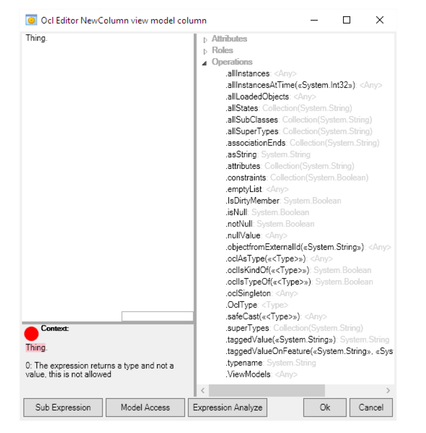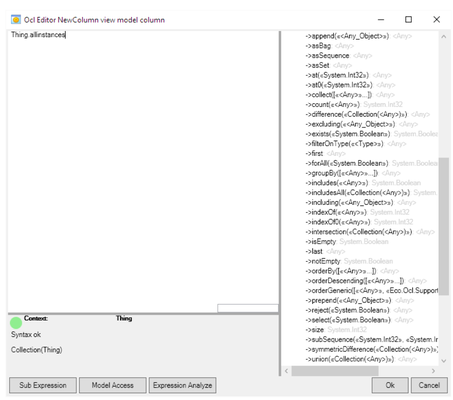OCLOperators
No edit summary |
|||
| Line 84: | Line 84: | ||
== Collection operators == | == Collection operators == | ||
Once you have a collection of objects there are certain operators that are applicable to it. Again you can use the OCL-Editor to see what they are: | Once you have a collection of objects there are certain operators that are applicable to it. | ||
See this page for [[examples on collection operators]] | |||
Again you can use the OCL-Editor to see what they are: | |||
[[File:Collection of objects operators.png|frameless|453x453px|link=https://wiki.mdriven.net/index.php/File:Collection_of_objects_operators.png]] | [[File:Collection of objects operators.png|frameless|453x453px|link=https://wiki.mdriven.net/index.php/File:Collection_of_objects_operators.png]] | ||
Revision as of 15:39, 13 August 2017
This page was created by Alexandra on 2017-08-08. Last edited by Stephanie@mdriven.net on 2025-03-10.
General operators
To find all available you can open the OCL-Editor and type in a class:
| Operators | Description |
|---|---|
| Allinstances | All the objects of the class |
| allinstancesAtTime | All the currently loaded instances |
| AllStates | Meta information about available states in state machines the class may contain |
| allSubClasses | Meta information on all the sub classes this class has |
| AllSuperTypes | Meta information on all the super classes – in inheritance order the class has |
| associationEnds | Meta information on all the associationEnds |
| Asstring | The string representation of the class – the asString operation is available on everything |
| Attributes | Meta information about what attributes the class has |
| Contraints | Meta information on what constraints the class has |
| Emptylist | Returns an empty list typed to hold objects of the class |
| IsDirtyMember | |
| isNull | |
| nullValue | A typed null value |
| objectFromExternalId | An external identity will be resolved to the object |
| oclAsType | The type of the class |
| oclIsKindOf | This is to if a class is a subclass or a the class itself and not unrelated |
| oclIsTypeOf | Returns true if |
| oclSingleton | Classes that implements the Singleton pattern – by setting IsSingleton=true – will return the singleton instance with this operator |
| OclType | |
| safeCast | |
| SuperTypes | |
| TaggedValue | Meta information on tagged values set in the class |
| TaggedValueOnFeature | Meta information on Tagged values set on a named feature in the class |
| Typename | The type name as a string |
| ViewModels | A tuple with the ViewModels for this class a members |
Collection operators
Once you have a collection of objects there are certain operators that are applicable to it.
See this page for examples on collection operators
Again you can use the OCL-Editor to see what they are:
| Operators | Description |
|---|---|
| ->append | Add another object last |
| ->asBag | Collapses to one list |
| ->asSequence | Collapses to one list |
| ->asset | Remove doublets |
| ->at | Get the objects at X where the first index is 1 |
| ->at0 | Get the objects at X where the first index is 0 |
| ->collect | Iterate over the collection and build a tuple result |
| ->count | Count how many meet a certain criteria |
| ->difference | The difference between 2 collections |
| ->excluding | The collection except this single object |
| ->exists | Are there any objects that fulfill the criteria |
| ->filterOnType | Only keep the ones of a certain type |
| ->first | Return the first object |
| ->forAll | Iterate all that fulfills the critera |
| ->groupBy | Build collection of tuples grouped by some aspect |
| ->includes | Does the collection include the object |
| ->includesAll | Does the collection include the whole other collection |
| ->including | |
| ->IndexOf | The 1 based index of an object in the collection possibly -1 if not existing |
| ->indexOf0 | The 0 based index of an object in the collection possibly -1 if not existing |
| ->intersection | The intersection of two collections |
| ->isEmpty | Returns true if the collection is empty |
| ->last | Returns the last object in the collection |
| ->notEmpty | Returns true of the collection is not empty |
| ->orderBy | Sorts the collection on one or more properties |
| ->orderDescending | Sort the from biggest to smallest |
| ->orderGeneric | Sorts the list of properties with interchangeable sort order: (expr1, OclSortDirection::ascending, expr2, OclSortDirection::descending...) |
| ->prepend | Add an object in front of the list |
| ->reject | Returns the objects not matching the criteria |
| ->select | Returns the objects matching the criteria |
| ->size | Returns the number of elements in the collection |
| ->subsequence | Returns a smaller collection from a start to stop |
| ->symmetricDifference | The symmetric difference between the collections; ie all the objects in collection1 or collection2 but not in both |
| ->union | The set of objects in collection1 and objects in collection2 |


